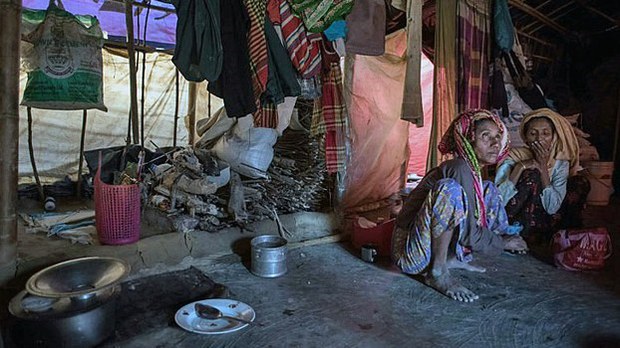UN Rights Council Condemns Myanmar’s ‘Crimes’ Against Rohingya
2017.12.05
 Rohingya refugees sit in their shelter in the Kutupalong refugee camp in southeastern Bangladesh's Cox's Bazar district, Dec. 4, 2017.
Rohingya refugees sit in their shelter in the Kutupalong refugee camp in southeastern Bangladesh's Cox's Bazar district, Dec. 4, 2017.
The U.N. Human Rights Council (UNHRC) on Tuesday condemned Myanmar for the “very likely commission of crimes against humanity” by government security forces and non-state actors that caused a massive exodus of Rohingya Muslims this year.
In a resolution introduced by Bangladesh and Saudi Arabia, UNHRC accused Myanmar’s military of committing atrocities against Rohingya Muslims in Rakhine state during two recent crackdowns that targeted the ethnic group, first in October 2016 and then in August 2017.
Since late August, at least 626,000 Rohingya have crossed into southeastern Bangladesh as they sought shelter from the latest outbreak of violence in northern Rakhine.
“As you all aware of, crimes committed against Rohingya included summary execution[s] of adults [and] children, indiscriminate rape of women and girls as a weapon of persecution, torture and detention, aerial firing toward the fleeing population, [the] burning of households and properties, planting landmines and so on,” Mohammed Shahriar Alam, Bangladesh’s state minister for foreign affairs, told a special session of the council in Geneva, according to an official video recording.
All these acts “were perpetrated by Myanmar Security forces and extremist Buddhist vigilantes since 9th October, 2016” and they took “a horrific turn in intensity since August 25th, 2017,” the Bangladeshi diplomat said.
Zeid Ra'ad Al Hussein, the U.N.’s high commissioner for human rights, urged the council to recommend that the United Nations General Assembly establish a new mechanism for assisting with criminal investigations of perpetrators of violence against Rohingya.
During the session, he cited systematic discrimination against Rohingya, policies of segregation, and recent allegations of killings, stabbings, beatings to death, burnings of houses with families inside, rape and sexual abuse, forced displacement, and the systematic destruction of villages, homes and livelihoods.
Given this, Zeid asked the 47-member body how anyone could rule out that “elements of genocide” might be present.
The United Nations, the United States and other entities had said earlier that the crackdown amounted to “ethnic cleansing.”
33 in favor, three opposed
The resolution received 33 votes in favor, nine abstentions, two absences, and three opposed, including China.
China has proposed a three-phase solution to address the crisis, involving ending the violence and restoring stability and order to the region, repatriating refugees, and developing long-term solutions to poverty in Rakhine state as a root cause of the conflict.
Alam, Bangladesh’s state minister, said his country remained very concerned that Myanmar had not conducted a credible national investigation into alleged human rights violations.
Htin Lynn, Myanmar’s permanent representative to the U.N. in Geneva, said that although Myanmar was ready to increase cooperation with the U.N. to support national efforts to improve the situation in Rakhine state, it was first necessary to focus on repatriating the refugees, according to a statement issued Tuesday by Zeid’s office (OHCHR).
On Nov. 23, Myanmar and Bangladesh signed an agreement for Rohingya living in camps in southeastern Bangladesh to voluntarily return to northern Rakhine – a process that Myanmar said would begin within two months.
Htin Lynn said the returnees would be housed in temporary places – but not camps – until arrangements were made to relocate them to their places of origin.
During Tuesday’s meeting in Geneva, the United States called on Myanmar to grant access to a fact-finding mission and unhindered humanitarian access to the region, adding that nothing could justify the campaign against the Rohingya in Rakhine, which it said was premeditated. The U.S. also called for the reform of Myanmar’s 1982 Citizenship Law which prevents the Rohingya from becoming citizens though many have lived in the country for generations.
In March, the U.N. council created a three-person independent fact-finding mission to investigate alleged human rights violations by the Myanmar military and security forces in the northern part of Rakhine.
Myanmar disassociated itself from the call for the urgent dispatch of a fact-finding mission, and the government refused to grant entry visas to commission members.
Instead, the council dispatched three teams to Bangladesh to conduct interviews with Rohingya and other groups in sprawling refugee camps around Cox’s Bazar and elsewhere in southeastern Bangladesh.
Myanmar denials
Myanmar’s government and army have denied allegations of mistreatment of the Rohingya during the latest crackdown.
Rights groups welcomed the resolution and called for perpetrators of the violence to be held accountable for their actions.
“To date, there has been no accountability for the serious human rights violations committed by the Myanmar security forces, some of which constitute crimes against humanity,” Amnesty International told the Human Rights Council. “The Myanmar authorities continue to downplay the seriousness of the reports, while refusing to cooperate with the fact-finding mission created by this Council.”
New York-based Human Rights Watch said the council had sent a strong message to the Myanmar government that the world would not turn away from the Rohingya crisis.
“The U.N. resolution makes clear that the international community retains a watchful eye over the plight of the Rohingya and demands action,” Laila Matar, senior U.N. advocate at Human Rights Watch, said in a statement.
“But it needs to ensure that its rhetoric is matched by its will to prevent further mistreatment, forced returns, and assaults to the human rights and dignity of the Rohingya,” she said.
In November, the U.N. Security Council failed to pass a resolution condemning the violence in Myanmar’s northern Rakhine, and instead issued a statement after acquiescing to strong objections by China.
The council then issued a presidential statement calling on the Myanmar government to end the use of excessive military force and intercommunal violence that had devastated Rohingya communities during the military crackdowns.
This report was prepared by Radio Free Asia (RFA) a sister entity of BenarNews. Ashif Rabi in Washington contributed to this report.







